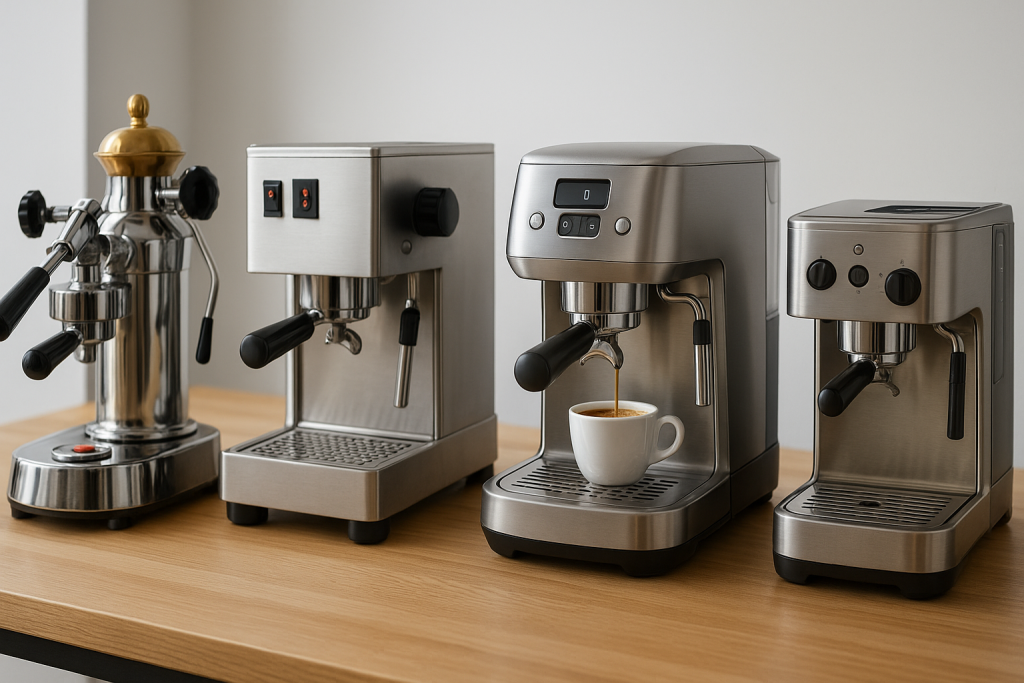
If you’re running a coffee shop, restaurant, office, or any high-traffic establishment, investing in the right commercial coffee machine can be the difference between satisfied customers and frustrated ones. With so many options available, it can be overwhelming to know where to start.
This comprehensive guide combines all the essential information to help you make an informed decision — from types and features to brand comparisons and buying tips.
Disclosure: This post may contain affiliate links. As an Amazon Associate, we earn from qualifying purchases.
Types of Commercial Coffee Machines
Understanding the different types of machines is the first step in finding the best fit for your business needs.
1. Super-Automatic Espresso Machines
These are the ultimate all-in-one systems. Super-automatic machines grind the beans, tamp the puck, brew the espresso, and froth the milk — all at the push of a button. They’re ideal for businesses without trained baristas or for high-efficiency environments like hotel lobbies or large offices. Some even feature touchscreen interfaces and programmable drink menus.
2. Automatic Espresso Machines
These machines automate most of the brewing process but still require manual milk frothing. They’re great for busy cafes and restaurants looking for consistency and speed.
3. Semi-Automatic Espresso Machines
These provide full control over the brewing process, including tamping and timing. They’re ideal for specialty coffee shops where skilled baristas craft every cup.
4. Manual Espresso Machines
Best suited for high-end specialty coffee operations, these machines allow complete control but require extensive training.
5. Pour-Over and Automatic Drip Brewers
These are common in diners, conference centers, and offices. Pour-over brewers need to be filled manually with water, while automatic models connect directly to a water line for continuous use. Many brew large volumes and keep the coffee warm in airpots or thermal carafes.
6. Single-Serve Commercial Machines
Designed for flexibility and speed, these machines offer pods or capsules to brew a variety of beverages. Common in offices and convenience stores, they provide different options with minimal cleanup.
Key Features to Consider
When evaluating commercial coffee machines, look beyond just price and brand. These features play a critical role in long-term satisfaction:
Volume & Capacity
- How many drinks do you serve per hour?
- High-traffic operations need machines capable of producing 100+ cups per hour.
Boiler Type
- Dual-boiler systems allow simultaneous brewing and steaming — a must for busy shops.
- Heat exchange systems can be a good mid-tier solution.
Water Supply: Plumbed vs. Pour-Over
- Plumbed machines connect directly to your water line and are ideal for high-volume use.
- Pour-over machines offer mobility and lower installation cost but require refilling.
Built-In Grinder
- Essential for freshness. Many super-automatic machines have built-in grinders.
Steam Wands / Milk Frothing
- Auto-frothers save time, while manual wands allow more control and better texture.
User Interface
- Touchscreens, programmable drink settings, and self-cleaning options can enhance usability and reduce training time.
Maintenance
- Some machines include automated cleaning cycles.
- Others may require daily manual cleaning and regular descaling.
Best Commercial Coffee Machine Brands
La Marzocco
Premium machines known for durability and precision. A top choice among third-wave coffee shops.
Nuova Simonelli
Reliable and cost-effective, often used in competition settings and by barista schools.
Franke
Leading manufacturer of high-end super-automatic machines for large operations and corporate use.
Jura
Excellent for automated office use with minimal hands-on work.
BUNN
Trusted for decades, particularly in the automatic drip coffee segment.
Rancilio
A favorite in traditional cafés, known for robust semi-automatic machines.
Breville Commercial / Sage Pro
Popular among high-end home and prosumer markets, now entering light commercial space.
Cost Considerations
Commercial machines vary widely in price:
- Entry-Level: $1,000 – $3,000 (great for small offices or mobile setups)
- Mid-Tier: $3,000 – $8,000 (suitable for small to medium-sized cafés)
- High-End: $10,000+ (top-of-the-line machines for high-volume operations)
Don’t forget the total cost of ownership, which includes
- Filters and water softeners
- Grinder (if not built-in)
- Regular maintenance and service contracts
- Energy use and cleaning supplies
Where to Buy
When you’re ready to make a purchase, these sources offer competitive pricing and trusted service:
- Seattle Coffee Gear – In-depth reviews, excellent customer service.
- WebstaurantStore – Wide selection and good prices for hospitality industry.
- Espresso Parts – Specializes in high-end espresso gear and accessories.
- Amazon Business – Convenient for small offices and quick shipping.
Final Tips Before Buying
- Know your use case – Office breakroom needs are different from café requirements.
- Test in person – If possible, visit a showroom.
- Check warranty and service – Some brands offer better support than others.
- Plan for future growth – Buy slightly more capacity than you currently need.
- Look at reviews from similar businesses – Learn from real-world feedback.
Conclusion
Choosing the right commercial coffee machine is more than just picking a brand — it’s about aligning your choice with your business goals, staff skill level, and customer expectations. Whether you prioritize automation, control, or high-volume brewing, there’s a perfect machine out there for you.
Use this guide to confidently navigate the world of commercial coffee machines and make an investment that pays off in quality, efficiency, and customer satisfaction.
Next Steps:
- Need help choosing for your office? See our Best Coffee Makers for the Office
Back to Coffee and Espresso 101
